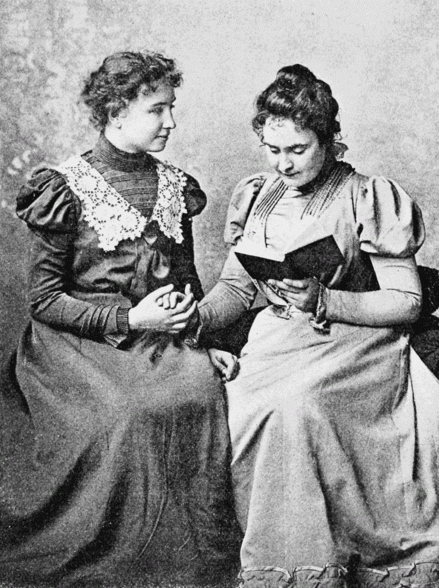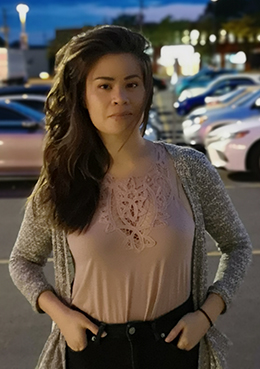This piece was reprinted by OpEd News with permission or license. It may not be reproduced in any form without permission or license from the source.
Helen was an unruly child and rather mischievous. The first day Anne Sullivan arrived to their homestead (she was to live in the same house as Helen's teacher), Helen managed to lock Anne Sullivan in her room and hid the key. No amount of commotion could sway Helen to reveal the location of the key and her father had to help Anne out of her room through her bedroom window and onto a ladder. Helen only produced the key months later.
As Helen describes it herself, in her "still, dark world" there was no strong sentiment or tenderness." Helen could not love anything in this state, for she had no link to the world of thought, of ideas. The world of Helen was an impatient world of desires and disappointments, how could one be patient if one didn't even have a concept of a day, let alone a concept of the treasures of the past and the riches of the future?

Helen Keller with Anne Sullivan in July 1888.
(Image by Wikipedia (commons.wikimedia.org), Author: Family member of Thaxter P. Spencer, now part of the R. Stanton Avery Special Collections, at the New England Historic Genealogical Society. See Press Release [1] for more information.) Details Source DMCA
Anne Sullivan was in the process of teaching Helen the sign words for objects around the house. At first amused at the new game, Helen was eager to learn the hand tricks, however, soon grew tired of it suspecting it to be more a mandatory chore than a real game. Helen was especially frustrated with how there could be a word for cup and a different word for the water in the cup. To Helen, it made perfect sense that the water in the cup should also be called cup, and the exercise was left for another day.
The next day, Helen grew into a fury over Anne attempting to return to the exercise on cup vs water, and she threw the doll that was given to her as a gift the day of Anne's arrival (Helen would find out much later that it had been carefully made by the blind girls at the Perkins Institute), she describes the situation as such:
I became impatient at her repeated attempts and, seizing the new doll, I dashed it upon the floor. I was keenly delighted when I felt the fragments of the broken doll at my feet. Neither sorrow nor regret followed my passionate outburst. I had not loved the doll. In the still, dark world in which I lived there was no strong sentiment or tenderness. I felt my teacher sweep the fragments to one side of the hearth, and I had a sense of satisfaction that the cause of my discomfort was removed. She brought me my hat, and I knew I was going out into the warm sunshine. This thought, if a wordless sensation may be called a thought, made me hop and skip with pleasure.
We walked down the path to the well-house, attracted by the fragrance of the honeysuckle with which it was covered. Some one was drawing water and my teacher placed my hand under the spout. As the cool stream gushed over one hand she spelled into the other the word water, first slowly, then rapidly. I stood still, my whole attention fixed upon the motions of her fingers. Suddenly I felt a misty consciousness as of something forgotten a thrill of returning thought; and somehow the mystery of language was revealed to me. I knew then that "w-a-t-e-r" meant the wonderful cool something that was flowing over my hand. That living word awakened my soul, gave it light, hope, joy, set it free! There were barriers still, it is true, but barriers that could in time be swept away.
I left the well-house eager to learn. Everything had a name, and each name gave birth to a new thought. As we returned to the house every object which I touched seemed to quiver with life. That was because I saw everything with the strange, new sight that had come to me. On entering the door I remembered the doll I had broken. I felt my way to the hearth and picked up the pieces. I tried vainly to put them together. Then my eyes filled with tears; for I realized what I had done, and for the first time I felt repentance and sorrow.
It is most striking to note here, that Helen described her first realisation that there was such a thing as language as an immediate connection, an immediate understanding that there was such a thing as thoughts, which required the use of language to not only communicate with others but with ourselves in the form of inner dialogue. Not only this, but Helen credits her new awareness of thought as what directly gave her almost immediate access to the feeling of repentance and sorrow.
Helen recounts how shortly after, she came to understand the concept of love:
I remember the morning that I first asked the meaning of the word, "love." This was before I knew many words. I had found a few early violets in the garden and brought them to my teacher. She tried to kiss me: but at that time I did not like to have any one kiss me except my mother. Miss Sullivan put her arm gently round me and spelled into my hand, "I love Helen"
"What is love?" I asked.
She drew me closer to her and said, "It is here," pointing to my heart, whose beats I was conscious of for the first time. Her words puzzled me very much because I did not then understand anything unless I touched it.
I smelt the violets in her hand and asked, half in words, half in signs, a question which meant, "Is love the sweetness of flowers?"
"No," said my teacher.
Again I thought. The warm sun was shining on us.
"Is this not love?" I asked, pointing in the direction from which the heat came. "Is this not love?"
It seemed to me that there could be nothing more beautiful than the sun, whose warmth makes all things grow. But Miss Sullivan shook her head, and I was greatly puzzled and disappointed. I thought it strange that my teacher could not show me love.
A day or two afterward I was stringing beads of different sizes in symmetrical groups two large beads, three small ones, and so on. I had made many mistakes, and Miss Sullivan had pointed them out again and again with gentle patience. Finally I noticed a very obvious error in the sequence and for an instant I concentrated my attention on the lesson and tried to think how I should have arranged the beads. Miss Sullivan touched my forehead and spelled with decided emphasis, "Think."
In a flash I knew that the word was the name of the process that was going on in my head. This was my first conscious perception of an abstract idea.
For a long time I was still I was not thinking of the beads in my lap, but trying to find a meaning for "love" in the light of this new idea. The sun had been under a cloud all day, and there had been brief showers; but suddenly the sun broke forth in all its southern splendour.
Again I asked my teacher, "Is this not love?"
"Love is something like the clouds that were in the sky before the sun came out," she replied. Then in simpler words than these, which at that time I could not have understood, she explained: "You cannot touch the clouds, you know, but you feel the rain and know how glad the flowers and the thirsty earth are to have it after a hot day. You cannot touch love either; but you feel the sweetness that it pours into everything. Without love you would not be happy or want to play."
The beautiful truth burst upon my mind I felt that there were invisible lines stretched between my spirit and the spirits of others.
This is again incredibly striking, Helen is describing here that her first realisation, her first understanding of love was not through a physical act of love, for ex. a warm hug, a tender caress, kiss on the cheek, pat on the head, etc, but rather, through her ability to conceptualise love as an abstract idea, through her teacher's emphasis on the process of thought. Only when Helen understood love as something all encompassing and yet something that could not be touched, did she have an understanding of the most profound form of love, like "invisible lines stretched between my spirit and the spirits of others."

Helen Keller (to the left) and Anne Sullivan (to the right). Anne Sullivan reading a book to Helen who is .listening. by using her hand.
(Image by Wikipedia (commons.wikimedia.org), Author: Unknown author) Details Source DMCA
Thus I came up out of Egypt and stood before Sinai, and a power divine touched my spirit and gave it sight, so that I beheld many wonders. And from the sacred mountain I heard a voice which said, "Knowledge is love and light and vision"
"Have you ever been at sea in a dense fog, when it seemed as if a tangible white darkness shut you in, and the great ship, tense and anxious, groped her way toward the shore with plummet and sounding-line, and you waited with beating heart for something to happen? I was like that ship before my education began, only I was without compass or sounding-line, and had no way of knowing how near the harbour was. "Light! give me light!' was the wordless cry of my soul, and the light of love shone on me in that very hour"As my knowledge of things grew I felt more and more the delight of the world I was in.
Helen Keller (to the left) and Anne Sullivan (to the right). Anne Sullivan reading a book to Helen who is "listening" by using her hand on Anne's mouth.
Next Page 1 | 2 | 3 | 4 | 5 | 6
(Note: You can view every article as one long page if you sign up as an Advocate Member, or higher).





